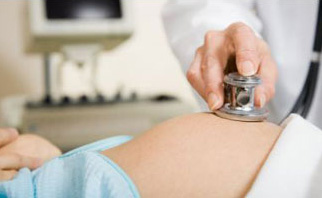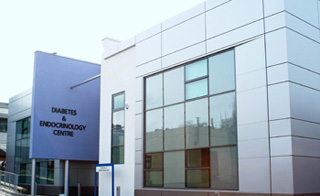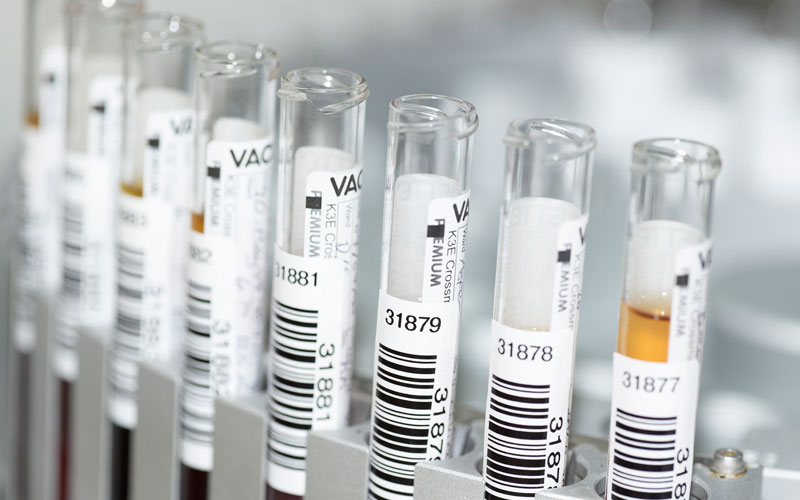Heartlands Hostpital
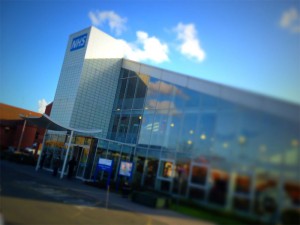 The diabetes centre at Heartlands Hospital operates as the main hub for all diabetes services at the trust. The outpatient services are developed based on the local needs of the population as well as in keeping with the academic status of the unit. Following merger of Solihull and Heartlands hospital, there has been improved co-ordination of diabetes services across the two sites that has enabled cross working between the two sites. While some of the essential services are made available at both sites, patients from all the three sites have unrestricted access to specialised diabetes services some of which are located at the Heartlands site. The diabetes centre at Heartlands functions as a one stop clinic with access to multidisciplinary care all under one roof. There are 10,000 patients registered with the diabetes clinics across the trust accounting for nearly 26,000 visits annually.
The diabetes centre at Heartlands Hospital operates as the main hub for all diabetes services at the trust. The outpatient services are developed based on the local needs of the population as well as in keeping with the academic status of the unit. Following merger of Solihull and Heartlands hospital, there has been improved co-ordination of diabetes services across the two sites that has enabled cross working between the two sites. While some of the essential services are made available at both sites, patients from all the three sites have unrestricted access to specialised diabetes services some of which are located at the Heartlands site. The diabetes centre at Heartlands functions as a one stop clinic with access to multidisciplinary care all under one roof. There are 10,000 patients registered with the diabetes clinics across the trust accounting for nearly 26,000 visits annually.
Solihull Hospital
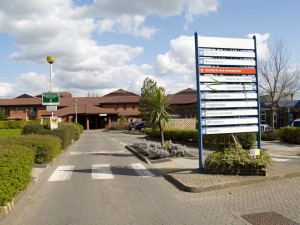 Diabetes services at Solihull Hospital are led by Dr Andrew Bates and are supported by Dr Muhammad Ali Karamat, Dr Ali Kamal, Prof Stevens, Prof Barnett, Dr Jayadave Shakher and Dr Azam. Dr Bates and Dr Karamat are primarily based at Solihull hospital and also provide in patient diabetes care. There are a range of diabetes outpatient clinics at Solihull Hospital including the complex/ general diabetes clinics, Diabetic foot clinic ( runs parallel to general diabetes clinic), diabetes antenatal clinic, insulin pump clinic and nurse led clinics. All clinics are supported by the Diabetes Specialist Nursing team, dieticians and podiatry team. In addition to the diabetes clinics on the Solihull Hospital site, the Diabetes Consultants also support community clinics ( Dr Bates, Dr Karamat and Dr Ali Kamal). Some of these clinics run on a weekly basis and are supported by GPs with special interest Dr Iyer and Dr Gandhi.
Diabetes services at Solihull Hospital are led by Dr Andrew Bates and are supported by Dr Muhammad Ali Karamat, Dr Ali Kamal, Prof Stevens, Prof Barnett, Dr Jayadave Shakher and Dr Azam. Dr Bates and Dr Karamat are primarily based at Solihull hospital and also provide in patient diabetes care. There are a range of diabetes outpatient clinics at Solihull Hospital including the complex/ general diabetes clinics, Diabetic foot clinic ( runs parallel to general diabetes clinic), diabetes antenatal clinic, insulin pump clinic and nurse led clinics. All clinics are supported by the Diabetes Specialist Nursing team, dieticians and podiatry team. In addition to the diabetes clinics on the Solihull Hospital site, the Diabetes Consultants also support community clinics ( Dr Bates, Dr Karamat and Dr Ali Kamal). Some of these clinics run on a weekly basis and are supported by GPs with special interest Dr Iyer and Dr Gandhi.
Recently , there has been a review of the diabetes services at Solihull Hospital with a view to providing a more comprehensive and integrated diabetes care within the Solihull Clinical Commissioning group. This plan will allow greater co-ordination between primary, community and secondary care services and provide seamless care for patients with diabetes.
Good Hope Hospital
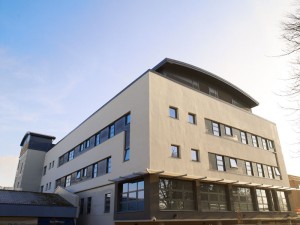 Good Hope Hospital is one of main acute hospitals within the Heart Of England NHS Trust. Diabetes services at the Good Hope site have been developed to cater to the needs of the local population and are lead locally by Dr Sharon Jones. Currently there are 3 consultants working on the Good Hope site.The Good Hope consultants Drs Jones and Teh are joined for delivery of outpatient services by Dr Sud Ramachandran, Consultant Chemical Pathologist (Clinical).
Good Hope Hospital is one of main acute hospitals within the Heart Of England NHS Trust. Diabetes services at the Good Hope site have been developed to cater to the needs of the local population and are lead locally by Dr Sharon Jones. Currently there are 3 consultants working on the Good Hope site.The Good Hope consultants Drs Jones and Teh are joined for delivery of outpatient services by Dr Sud Ramachandran, Consultant Chemical Pathologist (Clinical).
The consultants on the Good Hope site provide diabetes and endocrine services to the local populations of North Birmingham and South Staffs. The majority of the GPs in the area provide excellent care and have undertaken accredited diabetes courses. Secondary care provision of diabetes services are therefore predominantly delivered to patients with complex clinical needs and for specialist diabetes services including new therapies, insulin pump therapy, continuous glucose monitoring, pre-pregnancy counselling, antenatal diabetes care, young adult care and acute diabetes foot care. There is also close working with the paediatric diabetes team particularly for transition clinics. The organisation of the directorate allows for all complex patients requiring additional care to be referred to Heartlands Hospital wherever necessary.
There are a number of peripheral clinics held at two community Hospitals, Sir Robert Peel Hospital in Tamworth and Samuel Johnson Hospital in Lichfield. The consultants work with the South Staffs DSNs and podiatrists in those clinics. The majority of our clinics book both new and follow up patients for consultant lists.
The diabetes team at Good Hope Hospital currently manage the inpatient beds on an ongoing care ward where patients with diabetes as a cause of admission or as an additional diagnosis are preferentially placed. During 2013 there will be reorganisation of general medical beds and ward responsibilities. It is planned that the Diabetes Consultants will reduce their inpatient beds to half a ward (the ward to be shared with another medical speciality), and will then provide an outreach, early review and admission avoidance service. Currently the team is supported by 2 SpRs, a Clinical Fellow, an ST1, one F2 and 2 F1s (one shared with Clinical Chemistry).



